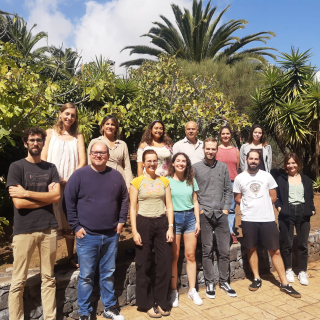Bibcode
Martínez-Delgado, D.; Gabany, R. Jay; Crawford, Ken; Zibetti, Stefano; Majewski, Steven R.; Rix, Hans-Walter; Fliri, J.; Carballo-Bello, J. A.; Bardalez-Gagliuffi, Daniella C.; Peñarrubia, Jorge; Chonis, Taylor S.; Madore, Barry; Trujillo, I.; Schirmer, Mischa; McDavid, David A.
Referencia bibliográfica
The Astronomical Journal, Volume 140, Issue 4, pp. 962-967 (2010).
Fecha de publicación:
10
2010
Número de citas
346
Número de citas referidas
295
Descripción
Within the hierarchical framework for galaxy formation, minor merging
and tidal interactions are expected to shape all large galaxies to the
present day. As a consequence, most seemingly normal disk galaxies
should be surrounded by spatially extended stellar "tidal features" of
low surface brightness. As part of a pilot survey for such interaction
signatures, we have carried out ultra deep, wide field imaging of eight
isolated spiral galaxies in the Local Volume, with data taken at small
(D = 0.1-0.5 m) robotic telescopes that provide exquisite surface
brightness sensitivity (μlim(V) ~ 28.5 mag
arcsec-2). This initial observational effort has led to the
discovery of six previously undetected extensive (to ~30 kpc) stellar
structures in the halos surrounding these galaxies, likely debris from
tidally disrupted satellites. In addition, we confirm and clarify
several enormous stellar over-densities previously reported in the
literature, but never before interpreted as tidal streams. Even this
pilot sample of galaxies exhibits strikingly diverse morphological
characteristics of these extended stellar features: great circle-like
features that resemble the Sagittarius stream surrounding the Milky Way,
remote shells and giant clouds of presumed tidal debris far beyond the
main stellar body, as well as jet-like features emerging from galactic
disks. Together with presumed remains of already disrupted companions,
our observations also capture surviving satellites caught in the act of
tidal disruption. A qualitative comparison with available simulations
set in a ΛCold Dark Matter cosmology (that model the stellar halo
as the result of satellite disruption evolution) shows that the
extraordinary variety of stellar morphologies detected in this pilot
survey matches that seen in those simulations. The common existence of
these tidal features around "normal" disk galaxies and the morphological
match to the simulations constitutes new evidence that these theoretical
models also apply to a large number of other Milky Way-mass disk
galaxies in the Local Volume.
Proyectos relacionados

Huellas de la Formación de las Galaxias: Poblaciones estelares, Dinámica y Morfología
Bienvenida a la página web del g rupo de investigación Traces of Galaxy Formation. Somos un grupo de investigación amplio, diverso y muy activo cuyo objetivo principal es entender la formación de galaxias en el Universo de una manera lo más completa posible. Con el estudio detellado de las poblaciones estelares como bandera, estamos constantemente
Ignacio
Martín Navarro